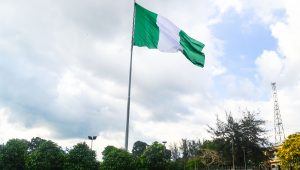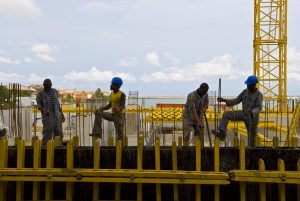Featured Commitment: Establish Beneficial Ownership Registry
Compromiso destacado: crear un registro de beneficiarios reales
Engagement en vedette: Établir un registre de propriété effective
What's in the 2019 Action Plans
This commitment story is featured in What’s in the 2019 Action Plans. Read the full publication here.
 What’s in the 2019 Action Plans
Explore commitments OGP members made in their 2019 action plans, including commitments to watch in each of the eight focus policy areas in OGP’s three year strategy.
What’s in the 2019 Action Plans
Explore commitments OGP members made in their 2019 action plans, including commitments to watch in each of the eight focus policy areas in OGP’s three year strategy.
 Nigeria’s lack of commercial due diligence requirements has enabled money laundering, drug trafficking, terrorism, and grand corruption. To address these issues, Nigeria made a commitmentOGP commitments are promises for reform co-created by governments and civil society and submitted as part of an action plan. Commitments typically include a description of the problem, concrete action... in its 2017 OGP action planAction plans are at the core of a government’s participation in OGP. They are the product of a co-creation process in which government and civil society jointly develop commitments to open governmen... to collect and disclose beneficial ownershipDisclosing beneficial owners — those who ultimately control or profit from a business — is essential for combating corruption, stemming illicit financial flows, and fighting tax evasion. Technical... More information. Although a website was launched to house data for the extractives sector, the required legislationCreating and passing legislation is one of the most effective ways of ensuring open government reforms have long-lasting effects on government practices. Technical specifications: Act of creating or r... was not adopted. In 2019, Nigeria committed to push ahead with legally requiring the collection of beneficial ownership information and publishing it in open register according to international standards. In August of 2020, President Muhammadu Buhari signed the new beneficial ownership registry into law as part of the Companies and Allied Matters Act, 2020 (CAMA). The government plans to raise awareness of the register and train people on to use it. Altogether, this reform could mobilize domestic resources and fight corruption by making it harder for people to use anonymous companies to avoid taxation and contribute to illicit financial flows.
Nigeria’s lack of commercial due diligence requirements has enabled money laundering, drug trafficking, terrorism, and grand corruption. To address these issues, Nigeria made a commitmentOGP commitments are promises for reform co-created by governments and civil society and submitted as part of an action plan. Commitments typically include a description of the problem, concrete action... in its 2017 OGP action planAction plans are at the core of a government’s participation in OGP. They are the product of a co-creation process in which government and civil society jointly develop commitments to open governmen... to collect and disclose beneficial ownershipDisclosing beneficial owners — those who ultimately control or profit from a business — is essential for combating corruption, stemming illicit financial flows, and fighting tax evasion. Technical... More information. Although a website was launched to house data for the extractives sector, the required legislationCreating and passing legislation is one of the most effective ways of ensuring open government reforms have long-lasting effects on government practices. Technical specifications: Act of creating or r... was not adopted. In 2019, Nigeria committed to push ahead with legally requiring the collection of beneficial ownership information and publishing it in open register according to international standards. In August of 2020, President Muhammadu Buhari signed the new beneficial ownership registry into law as part of the Companies and Allied Matters Act, 2020 (CAMA). The government plans to raise awareness of the register and train people on to use it. Altogether, this reform could mobilize domestic resources and fight corruption by making it harder for people to use anonymous companies to avoid taxation and contribute to illicit financial flows.
Learn more:
Featured Photo: Nigerian construction workers on site. Nigeria’s new registry will publicly disclose beneficial owners in various industries including construction and extractives. Photo by Arne Hoel / World Bank
Esta historia aparece en la publicación Qué hay en los planes de acción de 2019. Vea la publicación completa aquí.
 What’s in the 2019 Action Plans
Explore commitments OGP members made in their 2019 action plans, including commitments to watch in each of the eight focus policy areas in OGP’s three year strategy.
What’s in the 2019 Action Plans
Explore commitments OGP members made in their 2019 action plans, including commitments to watch in each of the eight focus policy areas in OGP’s three year strategy.
 La falta de un proceso adecuado de diligencia debida en Nigeria ha permitido el lavado de dinero, tráfico de drogas, terrorismo y corrupción a gran escala. Para atender estos problemas, Nigeria estableció en su plan de acción de OGP el compromiso de reunir y dar a conocer información sobre los beneficiarios reales. Aunque Nigeria ya contaba con un sitio web para alojar datos del sector extractivo, no se había adoptado la legislación asociada. En 2019, Nigeria se comprometió a impulsar un requisito legal de exigir la publicación de información sobre los beneficiarios reales en un registro abierto, alineado a los estándares internacionales. En agosto de 2020, el presidente Muhammadu Buhari promulgó el nuevo registro de beneficiarios reales como parte de la Ley de Empresas y Asuntos Aliados de 2020 (CAMA por sus siglas en inglés). El Gobierno sensibilizará y capacitará a las personas sobre cómo utilizar el registro. En su conjunto, estas reformas podrían movilizar recursos nacionales y luchar contra la corrupción, evitando que las personas utilicen empresas anónimas para evadir impuestos y contribuir a flujos financieros ilícitos.
La falta de un proceso adecuado de diligencia debida en Nigeria ha permitido el lavado de dinero, tráfico de drogas, terrorismo y corrupción a gran escala. Para atender estos problemas, Nigeria estableció en su plan de acción de OGP el compromiso de reunir y dar a conocer información sobre los beneficiarios reales. Aunque Nigeria ya contaba con un sitio web para alojar datos del sector extractivo, no se había adoptado la legislación asociada. En 2019, Nigeria se comprometió a impulsar un requisito legal de exigir la publicación de información sobre los beneficiarios reales en un registro abierto, alineado a los estándares internacionales. En agosto de 2020, el presidente Muhammadu Buhari promulgó el nuevo registro de beneficiarios reales como parte de la Ley de Empresas y Asuntos Aliados de 2020 (CAMA por sus siglas en inglés). El Gobierno sensibilizará y capacitará a las personas sobre cómo utilizar el registro. En su conjunto, estas reformas podrían movilizar recursos nacionales y luchar contra la corrupción, evitando que las personas utilicen empresas anónimas para evadir impuestos y contribuir a flujos financieros ilícitos.
Mas detalles:
En la foto: Trabajadores de construcción en Nigeria. El nuevo registro en Nigeria dará a conocer públicamente a los beneficiarios reales en diversas industrias como por ejemplo la construcción y las industrias extractivas. Imagen: Arne Hoel / Banco Mundial Photo by Arne Hoel / World Bank
Cette histoire est présentée dans la publication Contenu des plans d’action 2019. Voir la publication complète ici.
 What’s in the 2019 Action Plans
Explore commitments OGP members made in their 2019 action plans, including commitments to watch in each of the eight focus policy areas in OGP’s three year strategy.
What’s in the 2019 Action Plans
Explore commitments OGP members made in their 2019 action plans, including commitments to watch in each of the eight focus policy areas in OGP’s three year strategy.
Le manque de diligence raisonnable commerciale du Nigeria a favorisé le blanchiment d’argent, le trafic de drogue, le terrorisme et la grande corruption. Pour résoudre ces problèmes, le Nigeria s’est engagé, dans son plan d’action du PGO 2017, à recueillir et à divulguer des renseignements sur la propriété effective. Malgré le lancement d’un site Web pour héberger les données relatives au secteur des industries extractives, la législation nécessaire n’a pas été adoptée. En 2019, le Nigeria s’est engagé à faire avancer l’obligation légale de recueillir des renseignements sur la propriété effective et de les publier dans un registre ouvert conformément aux normes internationales. En août 2020, le président Muhammadu Buhari a signé le nouveau registre des bénéficiaires effectifs dans le cadre de la loi sur les sociétés et les affaires connexes, 2020 (CAMA selon ses sigles en anglais). Le gouvernement prévoit de sensibiliser et de former la population en ce qui concerne l’usage de ce registre. Dans l’ensemble, cette réforme pourrait mobiliser les ressources nationales et lutter contre la corruption en rendant plus difficile l’utilisation de sociétés anonymes pour échapper à l’impôt et contribuer à des flux financiers illicites.
En savoir plus:
Photo : Ouvriers du bâtiment au NIgeria. Le nouveau registre du Nigéria divulguera publiquement les bénéficiaires effectifs de diverses industries, comme la construction et les industries extractives. Arne Hoel / World Bank
No comments yet
Related Content

Beneficial Ownership
Beneficial ownership transparency has emerged as an important policy tool in countries for combating corruption, stemming illicit financial flows, and fighting tax evasion.

Nigeria
Nigeria’s third action plan continues open government reforms that aim to tackle corruption. Dedicated funding and a strong coalition of reformers set commitments to open the budget process and increase…

What’s in the 2019 Action Plans
Explore commitments OGP members made in their 2019 action plans, including commitments to watch in each of the eight focus policy areas in OGP’s three year strategy.


Leave a Reply